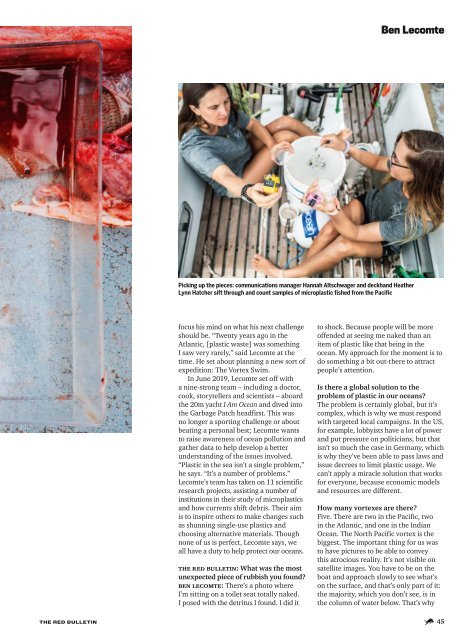Create successful ePaper yourself
Turn your PDF publications into a flip-book with our unique Google optimized e-Paper software.
Ben Lecomte<br />
Picking up the pieces: communications manager Hannah Altschwager and deckhand Heather<br />
Lynn Hatcher sift through and count samples of microplastic fished from the Pacific<br />
focus his mind on what his next challenge<br />
should be. “Twenty years ago in the<br />
Atlantic, [plastic waste] was something<br />
I saw very rarely,” said Lecomte at the<br />
time. He set about planning a new sort of<br />
expedition: <strong>The</strong> Vortex Swim.<br />
In June 2019, Lecomte set off with<br />
a nine-strong team – including a doctor,<br />
cook, storytellers and scientists – aboard<br />
the 20m yacht I Am Ocean and dived into<br />
the Garbage Patch headfirst. This was<br />
no longer a sporting challenge or about<br />
beating a personal best; Lecomte wants<br />
to raise awareness of ocean pollution and<br />
gather data to help develop a better<br />
understanding of the issues involved.<br />
“Plastic in the sea isn’t a single problem,”<br />
he says. “It’s a number of problems.”<br />
Lecomte’s team has taken on 11 scientific<br />
research projects, assisting a number of<br />
institutions in their study of microplastics<br />
and how currents shift debris. <strong>The</strong>ir aim<br />
is to inspire others to make changes such<br />
as shunning single-use plastics and<br />
choosing alternative materials. Though<br />
none of us is perfect, Lecomte says, we<br />
all have a duty to help protect our oceans.<br />
the red bulletin: What was the most<br />
unexpected piece of rubbish you found?<br />
ben lecomte: <strong>The</strong>re’s a photo where<br />
I’m sitting on a toilet seat totally naked.<br />
I posed with the detritus I found. I did it<br />
to shock. Because people will be more<br />
offended at seeing me naked than an<br />
item of plastic like that being in the<br />
ocean. My approach for the moment is to<br />
do something a bit out-there to attract<br />
people’s attention.<br />
Is there a global solution to the<br />
problem of plastic in our oceans?<br />
<strong>The</strong> problem is certainly global, but it’s<br />
complex, which is why we must respond<br />
with targeted local campaigns. In the US,<br />
for example, lobbyists have a lot of power<br />
and put pressure on politicians, but that<br />
isn’t so much the case in Germany, which<br />
is why they’ve been able to pass laws and<br />
issue decrees to limit plastic usage. We<br />
can’t apply a miracle solution that works<br />
for everyone, because economic models<br />
and resources are different.<br />
How many vortexes are there?<br />
Five. <strong>The</strong>re are two in the Pacific, two<br />
in the Atlantic, and one in the Indian<br />
Ocean. <strong>The</strong> North Pacific vortex is the<br />
biggest. <strong>The</strong> important thing for us was<br />
to have pictures to be able to convey<br />
this atrocious reality. It’s not visible on<br />
satellite images. You have to be on the<br />
boat and approach slowly to see what’s<br />
on the surface, and that’s only part of it:<br />
the majority, which you don’t see, is in<br />
the column of water below. That’s why<br />
THE RED BULLETIN 45

















